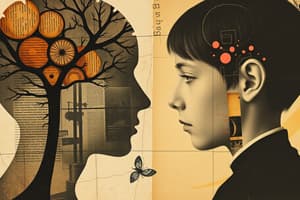Podcast
Questions and Answers
What is the due date for Test #1, covering Chapters 1-6?
What is the due date for Test #1, covering Chapters 1-6?
- September 25th
- November 6th
- November 20th
- October 2nd (correct)
How many multiple-choice questions will each test contain?
How many multiple-choice questions will each test contain?
- 30 questions
- 60 questions
- 40 questions
- 50 questions (correct)
Which chapters will be covered in Test #3?
Which chapters will be covered in Test #3?
- Chapters 15-19
- Chapters 7-10
- Chapters 1-6
- Chapters 11-14 (correct)
What is the email response time for inquiries?
What is the email response time for inquiries?
On which date does the course begin?
On which date does the course begin?
What percentage of the final grade does each test contribute?
What percentage of the final grade does each test contribute?
When will Test #2, covering Chapters 7-10, be conducted?
When will Test #2, covering Chapters 7-10, be conducted?
What is the testing window duration for Tests #1, #2, and #3?
What is the testing window duration for Tests #1, #2, and #3?
What is the primary focus of the Social Cognitive Theory?
What is the primary focus of the Social Cognitive Theory?
Which stage of Erikson's psychosocial development occurs during ages 4 to 5?
Which stage of Erikson's psychosocial development occurs during ages 4 to 5?
According to Piaget, what is the process of adjusting existing schemas to incorporate new information called?
According to Piaget, what is the process of adjusting existing schemas to incorporate new information called?
What is the main consequence of operant conditioning as described by Skinner?
What is the main consequence of operant conditioning as described by Skinner?
What aspect does the Biological Perspective emphasize in development?
What aspect does the Biological Perspective emphasize in development?
What is a key characteristic of classical conditioning as developed by Pavlov?
What is a key characteristic of classical conditioning as developed by Pavlov?
Which stage of cognitive development comes after the Preoperational stage according to Piaget?
Which stage of cognitive development comes after the Preoperational stage according to Piaget?
What is a limitation of Piaget's theory of cognitive development?
What is a limitation of Piaget's theory of cognitive development?
Which perspective focuses on the conflict between external demands and internal desires in a child's development?
Which perspective focuses on the conflict between external demands and internal desires in a child's development?
Which theorist is known for asserting that children are born as a 'tabula rasa'?
Which theorist is known for asserting that children are born as a 'tabula rasa'?
What do Erik Erikson’s stages of development primarily focus on?
What do Erik Erikson’s stages of development primarily focus on?
In Freud's structural theory of personality, which part represents instant gratification and biological demands?
In Freud's structural theory of personality, which part represents instant gratification and biological demands?
What concept refers to the idea that development can occur through gradual and continuous progress?
What concept refers to the idea that development can occur through gradual and continuous progress?
Which of the following theorists is credited with founding child development as an academic discipline?
Which of the following theorists is credited with founding child development as an academic discipline?
Which of the following stages is NOT part of Erik Erikson's theory of psychosocial development?
Which of the following stages is NOT part of Erik Erikson's theory of psychosocial development?
What does the maturation theory in developmental psychology emphasize?
What does the maturation theory in developmental psychology emphasize?
What does the socio-cultural perspective, developed by Vygotsky, primarily focus on?
What does the socio-cultural perspective, developed by Vygotsky, primarily focus on?
In which study design are individuals from different ages compared at the same time?
In which study design are individuals from different ages compared at the same time?
What does a correlation of -1.00 signify in statistical terms?
What does a correlation of -1.00 signify in statistical terms?
Which experimental group receives a treatment during a scientific study?
Which experimental group receives a treatment during a scientific study?
What does the term 'scaffolding' refer to in Vygotsky's approach?
What does the term 'scaffolding' refer to in Vygotsky's approach?
What is a key drawback of longitudinal studies?
What is a key drawback of longitudinal studies?
What is measured in a scientific experiment as the dependent variable?
What is measured in a scientific experiment as the dependent variable?
Which design combines elements of both the cross-sectional and longitudinal methods?
Which design combines elements of both the cross-sectional and longitudinal methods?
In observational research, what is the primary difference between naturalistic and laboratory observation?
In observational research, what is the primary difference between naturalistic and laboratory observation?
What is the main goal when using surveys in research?
What is the main goal when using surveys in research?
Study Notes
Introduction to Developmental Psychology
- Developmental psychology is a field that explores how people change throughout their lifespan.
- Early pioneers in the field include John Locke, G. Stanley Hall, and Alfred Binet and Theodore Simon.
Debates in Developmental Psychology
- Nature vs. Nurture: This debate addresses the relative influence of biological factors (nature) versus environmental factors (nurture) on development.
- Active vs. Passive: This debate focuses on whether children actively shape their development or are passively shaped by their environment.
- Continuous vs. Discontinuous: This debate explores whether development is a gradual and continuous process or occurs in distinct stages.
Theories of Human Development
- Behaviourism: This theory emphasizes the role of experience and learning in shaping behavior (John B. Watson).
- Maturation: This theory highlights the influence of biological factors on development (Arnold Gesell).
- Psychoanalytic Perspective: This theory focuses on the interplay of internal drives and external demands in shaping personality (Sigmund Freud).
Sigmund Freud's Theories
- Structural Theory: Freud proposed three parts of the personality: the id (unconscious drives), ego (conscious mediator), and superego (moral conscience).
- Psychosexual Stages of Development: Freud suggested that development progresses through a series of stages, each focused on a different erogenous zone. These stages include the oral, anal, phallic, latency, and genital stages.
Erik Erikson's Theory
- Psychosocial Development: Erikson's theory emphasizes the social and cultural influences on personality development.
- Eight Stages of Development: Erikson identified eight stages, each marked by a psychosocial crisis that individuals must resolve.
The Learning Perspective
- Behaviorism: This theory argues that learning occurs through associations between stimuli and responses (classical conditioning) and through the consequences of behaviors (operant conditioning).
- Social Cognitive Theory: This theory focuses on learning through observation, modeling, and vicarious experiences (Albert Bandura).
Cognitive-Developmental Theory
- Cognitive Schemas: Piaget proposed that cognitive development involves the construction and revision of mental representations (schemas).
- Assimilation and Accommodation: Assimilation involves fitting new information into existing schemas, while accommodation involves modifying schemas to accommodate new information.
- Four Stages of Cognitive Development: Piaget identified four stages: sensorimotor, preoperational, concrete operational, and formal operational.
The Biological Perspective
- Instinct and Fixed Action Patterns: This perspective emphasizes the role of genetics and biological processes in development, highlighting innate behaviors and patterns.
Bronfenbrenner's Ecological Theory
- Multiple Systems: Bronfenbrenner's theory emphasizes the interconnectedness of multiple environmental systems (microsystem, mesosystem, exosystem, macrosystem, and chronosystem) that influence development.
The Socio-Cultural Perspective
- Cultural and Social Influence: This perspective highlights the impact of culture and social interactions on development.
- Vygotsky's Theory: Vygotsky emphasized the importance of social interaction and cultural tools in cognitive development, proposing the concept of the zone of proximal development (ZPD) and scaffolding.
Methods of Studying Development
- Observation: Naturalistic observation occurs in natural settings, while laboratory observation takes place in a controlled environment.
- The Case Study: This method involves a detailed examination of a single individual's development.
- Surveys and Correlation: Surveys collect data from large groups, and correlational studies examine the relationships between variables.
- Experiment: This method is used to investigate cause-and-effect relationships, manipulating independent variables and measuring dependent variables. Ethical and practical considerations are crucial in research.
Studying Development Across Time
- Cross-Sectional Design: Compares individuals of different ages at a single point in time.
- Longitudinal Design: Studies the same individuals repeatedly over time.
- Sequential Design: Combines elements of cross-sectional and longitudinal designs, following multiple age groups over time.
Studying That Suits You
Use AI to generate personalized quizzes and flashcards to suit your learning preferences.
Related Documents
Description
This quiz explores foundational concepts in developmental psychology, including key debates such as nature vs. nurture and continuous vs. discontinuous development. It also covers influential theories and figures in the field. Test your understanding of how individuals change throughout their lives.




